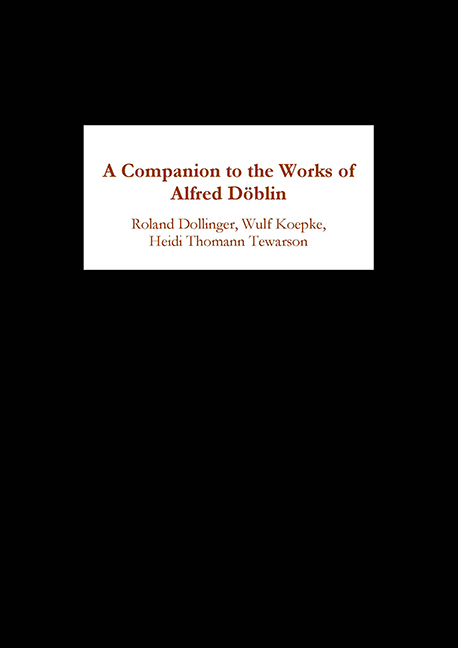Book contents
- Frontmatter
- Contents
- Foreword
- Abbreviations and Translations of Titles
- Works by Alfred Döblin
- Introduction
- Early Works
- Works of the Weimar Period
- The Fall of Wallenstein, or the Collapse of Narration? The Paradox of Epic Intensity in Döblin's Wallenstein
- Technology and Nature: From Döblin's Berge Meere und Giganten to a Philosophy of Nature
- “Arzt und Dichter”: Döblin's Medical, Psychiatric, and Psychoanalytical Work
- Döblin's Berlin: The Story of Franz Biberkopf
- Döblin's Engagement with the New Media: Film, Radio and Photography
- Döblin's Political Writings during the Weimar Republic
- Exile and Return to Europe
- Bibliography
- Notes on the Contributors
- Index
Technology and Nature: From Döblin's Berge Meere und Giganten to a Philosophy of Nature
from Works of the Weimar Period
Published online by Cambridge University Press: 27 April 2017
- Frontmatter
- Contents
- Foreword
- Abbreviations and Translations of Titles
- Works by Alfred Döblin
- Introduction
- Early Works
- Works of the Weimar Period
- The Fall of Wallenstein, or the Collapse of Narration? The Paradox of Epic Intensity in Döblin's Wallenstein
- Technology and Nature: From Döblin's Berge Meere und Giganten to a Philosophy of Nature
- “Arzt und Dichter”: Döblin's Medical, Psychiatric, and Psychoanalytical Work
- Döblin's Berlin: The Story of Franz Biberkopf
- Döblin's Engagement with the New Media: Film, Radio and Photography
- Döblin's Political Writings during the Weimar Republic
- Exile and Return to Europe
- Bibliography
- Notes on the Contributors
- Index
Summary
The rise of the European avant-garde movements during the first two decades of the twentieth century was closely linked to the powerful effects of technological and scientific innovations on the production of works of art. Germany's rapid industrialization after its unification in 1871 not only changed the political, social, and economic map of the Empire, but also led to the development of a modernist aesthetics in all cultural spheres. The two literary avant-garde movements with which Alfred Döblin's early novels are most often associated — futurism and Expressionism — demonstrate this interplay between technology and works of art both thematically and formally. The aesthetic specificity of many of Döblin's prose works is unthinkable without consideration of the impact of the technological and scientific revolutions on all areas of life.
This essay explores several texts by Döblin from the 1920s that show his growing interest in the triangular relationship between human beings, technology, and nature. In the fall of 1921 he began work on his monumental modern epos Berge Meere und Giganten (1924). Several months after its publication Döblin wrote an essay entitled “Bemerkungen zu ‘Berge Meere und Giganten’” for Die Neue Rundschau (SLW, 49–60), one of the most prestigious literary journals of the Weimar Republic. This essay is not only the most extensive commentary that Döblin has written about his novels but it also offers us, in conjunction with his essay “Der Geist des naturalistischen Zeitalters” (1924; SÄPL, 168–90), some important insights into his evolving and shifting reflections on technology and nature. Although Döblin's novel and his two theoretical essays express an ambivalent attitude toward technology and nature, an ambivalence that is characterized by the polarity between the domination of and simultaneous subjection to nature, Döblin attempts to overcome this polarity in his philosophy of nature, which he presented to the public in more systematic fashion in Das Ich über der Natur (1927). Through a careful reading of these texts, this essay explores Döblin's ideas about the relationships between the technological and scientific impulse of modernity, nature, and human life.
- Type
- Chapter
- Information
- A Companion to the Works of Alfred Döblin , pp. 93 - 110Publisher: Boydell & BrewerPrint publication year: 2003



